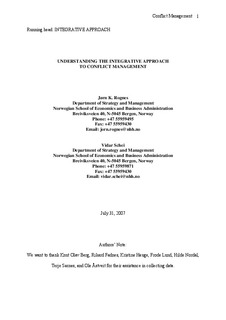| dc.contributor.author | Rognes, Jørn K. | |
| dc.contributor.author | Schei, Vidar | |
| dc.date.accessioned | 2010-05-12T11:58:53Z | |
| dc.date.available | 2010-05-12T11:58:53Z | |
| dc.date.issued | 2007-07 | |
| dc.identifier.issn | 1503-5093 | |
| dc.identifier.uri | http://hdl.handle.net/11250/164322 | |
| dc.description.abstract | The purpose of this paper is to examine the integrative approach to conflicts.
Integration is an active search for information about facts and interests - motivated by a
willingness to find mutually satisfactory agreements - and is usually necessary for creating
high quality settlements in conflicts. Thus, in order to understand how to avoid win-lose
outcomes, or impasses, we need knowledge about factors that relate to, and promote,
integration. We here use five data-sets to explore factors relating to individuals’ inclination to
integrate. Our results show that (a) degree of integration varies, that (b) the variation can be
explained by individual differences, by situational differences, and to some degree by group
differences, and that (c) integration predicts high quality outcomes in conflicts. | en |
| dc.language.iso | eng | en |
| dc.publisher | Norwegian School of Economics and Business Administration. Department of Strategy and Management | en |
| dc.relation.ispartofseries | Discussion paper | en |
| dc.relation.ispartofseries | 2007:1 | en |
| dc.subject | conflict management | en |
| dc.subject | negotiation | en |
| dc.subject | integrative style | en |
| dc.subject | integrative behavior | en |
| dc.title | Understanding the integrated approach to conflict management | en |
| dc.type | Working paper | en |
| dc.subject.nsi | VDP::Samfunnsvitenskap: 200::Økonomi: 210::Bedriftsøkonomi: 213 | en |
